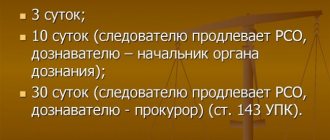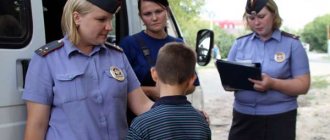Concept
The law enforcement system is structured in such a way that certain of its representatives, as part of their official duties and responsibilities, work with disadvantaged teenagers.
They are registered not at the whim of an individual, no, all actions of employees are prescribed in the order of the Ministry of Internal Affairs of Russia No. 569-2000.
The disadvantaged minors who are registered are surrounded by close attention , conversations are held with them, and they are monitored more carefully.
Registration for preventive registration
All actions regarding minors who come to the attention of police officers are carried out in full accordance with Order No. 569 of the Ministry of Internal Affairs of the Russian Federation of May 26, 2000.
At the same time, it should be understood that the efforts of special services workers and the actions and actions of parents should be directed in one direction - to bring the teenager to adulthood without serious consequences for him .
People in uniform are not required to report their every step to their parents, they simply do their job professionally , knowing it well and sometimes seeing it much deeper than mom and dad blinded by love, so there is no need to pit youngsters against juvenile affairs officers.
The final conclusion on whether to register a teenager can only be made collegiately at a meeting of the commission on juvenile affairs. Parents will be notified .
Newspaper "Rech" Issue dated January 11, 2022
Two young men, 17 years old, were drinking beer on the street. They were noticed by a police squad. Administrative violation reports were drawn up against both. The kids are doing well at school and are planning to go to university. Characteristic crossed out?
Accounting can be different
“Rech” is a frequent guest at meetings of the commission on juvenile affairs. And more than once I have witnessed how upset parents are when their child is “registered with the police” (as they call it). During adolescence, a child may stumble. I followed a friend's lead and stole a chocolate bar from a store. I felt like an adult and drank alcohol. What if this is 11th grade and you need to go to college?
Olga Larionova, head of the administrative relations department of the mayor's office, will help you understand Rech's situation .
Olga Nikolaevna, parents often ask: “In what case will a child be registered with the commission for minors? And what could be the consequences?
— Let’s say right away that there are several types of accounting: departmental accounting - in the juvenile affairs inspectorate (hereinafter referred to as IDN), intra-school (registration of minors and families in difficult life situations, in social protection institutions, dispensary registration in a clinic, etc.) , as well as interdepartmental registration - through the Commission on Minors' Affairs (this is registration of children and families in a socially dangerous situation). If the family situation improves, the family or teenager is subject to removal from the interdepartmental register; no legal consequences arise. However, at the request of judicial, investigative or law enforcement authorities, information about being on interdepartmental records is transferred to these authorities.
Got into a bad situation
Olga Larionova comments on a number of specific examples.
Danil, 17 years old, crossed the road outside the pedestrian crossing. This is the first time he has been brought to justice. Will he be registered with the juvenile affairs commission?
- No, they won’t. Part 1 of Article 12.29 of the Code of Administrative Offenses of the Russian Federation, which establishes liability for violation of the Traffic Rules by a pedestrian or passenger of a vehicle, provides for a warning or the imposition of an administrative fine in the amount of 500 rubles.
Artem, 13 years old, together with a friend of 12 years old, robbed a car in the yard. This is not the first time Artem has been brought to justice. Will it be put on interdepartmental registration?
- Yes. Grounds: commission of a socially dangerous act before reaching the age of criminal responsibility, repetition of offenses.
Mikhail, 16 years old. He was detained by the police, and not for the first time. Drank alcohol in the company of friends.
— This person is subject to departmental registration at the IDN and school, and consultation with a narcologist is also required on the problem of alcohol consumption by minors. Grounds: committing an administrative offense under Part 1 of Article 20.20 of the Code of Administrative Offenses of the Russian Federation. As the article states, consumption (drinking) of alcoholic beverages in a public place entails an administrative fine in the amount of 500 to 1,500 rubles.
Ruslan, 14 years old. I got into a fight with a classmate at school. This is not the first time he has let go. People are complaining about him.
“This teenager is also subject to departmental registration at the IDP and school, and consultation with a psychologist or psychiatrist about deviant behavior is also necessary. The reason is the commission of an administrative offense under Article 6.1.1 of the Code of Administrative Offenses of the Russian Federation “Beatings”.
Two young men of 17 years old were drinking beer. Detained by the police. The violation was committed for the first time. Both are in 11th grade. Both have good characteristics, both intend to go to college. Will they be registered?
— And these young people are subject to departmental registration at the IDN and school. The basis is the commission of an administrative offense under Part 1 of Article 20.20 of the Code of Administrative Offenses of the Russian Federation - consumption (drinking) of alcoholic beverages in a public place. This violation entails an administrative fine in the amount of 500 to 1,500 rubles. As for further consequences... It depends on what institute these teenagers intend to enroll in. If it is through the Ministry of Internal Affairs or the Ministry of Defense, then difficulties will definitely arise, since applicants to such universities undergo a very strict selection process.
“Top 5” reasons for registration
Olga Nikolaevna, please name the most typical violations for which teenagers are registered.
— “Top 5” grounds for registering minors with interdepartmental registration:
- Commission of crime;
— committing a socially dangerous act before reaching the age of criminal responsibility (14 years);
- use of narcotic, psychotropic or toxic substances;
- systematically committing unauthorized departures;
— return of a minor from a special closed-type educational institution.
Is it possible to erase the stain of administrative liability? Is there a statute of limitations?
— The time period during which a person is considered subject to administrative punishment is determined by Article 4.6 of the Code of Administrative Offenses of the Russian Federation:
1. A person who has been imposed an administrative penalty for committing an administrative offense is considered subject to this punishment from the day the decision on imposing an administrative penalty enters into legal force until the expiration of one year from the date of completion of execution of this decision, with the exception of the case provided for in Part 2 of this article.
2. A person who has been imposed an administrative penalty in the form of an administrative fine for committing an administrative offense and who has paid the administrative fine before the date of entry into force of the relevant resolution on the imposition of an administrative penalty is considered subject to this punishment from the date of entry into force of the specified resolution until the expiration of one year from the date of payment of the administrative fine.
That is, a person is considered subject to administrative punishment until the expiration of a year from the date of entry into force of the decision on the imposition of an administrative penalty (if there was a warning) or within a year from the date of payment of an administrative fine for the administrative offense committed. And if the specified period has passed, then the person is considered legally not brought to administrative responsibility.
Tatiana Kovacheva
Where do they register?
Registration of youths found to have committed misdeeds is maintained by a special unit for juvenile affairs (PDN), which is a structural unit of local police commissioners (UPP).
The system works like this: an offense committed by a child (theft, drinking alcohol, fighting, etc.) is recorded by the police , all protocols must be processed within three days after their registration by the KDN, whose proposals are submitted to the head of the police department or his deputy , and only these persons issue a final summary of registration.
Further accounting is carried out using special cards.
Causes
Thus, employees of the units for the prevention of juvenile delinquency (PPPD) of the city regional internal affairs agencies register certain categories of minors:
- those who have already committed offenses, but the punishment for them is administrative;
- systematically using alcohol and drugs;
- received a suspended sentence;
- those who are under investigation, but the preventive measure is subscription;
- constantly running away from institutions such as boarding schools, orphanages;
- released after serving their sentence;
- those who have already broken the law, but are not of age to apply adequate punishment;
- under investigation;
- amnestied, etc.
If a person under 16 years of age is involved in an accident
In this case, administrative punishment will also not follow. But, according to Part 3 of Article 26 of the Civil Code, such persons bear civil liability.
How does civil liability differ from administrative liability? If the latter is fines, deprivation of rights, evacuation, arrest and other administrative measures, then civil is liability for harm caused to others. This means that if a minor is driving and gets into an accident in which he causes damage to another car, then he must pay compensation for the damage.
But we also have bad news for persons under 14 years of age - in this case, parents, guardians or other trustees are responsible for him in civil matters.
But if a minor without a license caused serious harm to health or people died in an accident because of him, which falls under criminal liability, then nothing will happen to him again. The Criminal Code, unlike the Code of Administrative Offenses, provides for the responsibility of minors only from the age of 18. But from the age of 14 years, forced education measures can be applied to them - we are talking about a colony for minors.
Rules and grounds
there must be good reasons
The rules are as follows: as soon as the resolution on the committed administrative violation has gained legal force or the head of the internal affairs department has signed an affirmative signature, the minor will immediately be registered.
The basis for the statement is the commission of an act falling under one of the articles, the punishment for which provides for an administrative penalty , for example, a fine or other ( Order 569 of the Ministry of Internal Affairs of the Russian Federation, Article 34.1.2. ).
This paragraph explains that minors who have committed an offense resulting in the application of an administrative penalty are subject to registration with the police.
Stopped a drunk minor driving a car
In this case, the consequences for everyone will be almost the same as described above:
- no fine for a minor driving a car (including while drunk),
- fine of 30,000 rubles for transfer of control,
- evacuation to the impound lot if there is no one in the car who can drive it.
But there is still a difference between whether such a person is caught sober or drunk - if a minor is under the influence of alcohol or, even worse, drug intoxication, then with a high degree of probability he will be registered with a psycho-neurological dispensary with all the ensuing consequences from this.
Something else useful for you:
- Driving without a license while sober and deprived of a license - what is the punishment?
- Driving license deprivation court: ways to avoid responsibility and judicial practice
- If the license is expired and the driver is driving drunk, what is the punishment?
What is the threat?
Those who come under the watchful eye of the PDN are constantly checked for involvement in any incident in the area, reported to school, and also given monthly information to the district military registration and enlistment offices, and military service may be in question, and this negatively affects the young person’s capabilities in studies and future .
It would seem that there is nothing terrible - well, they put it on the register, but then they will remove it.
That’s true, but it’s better to prevent getting into the accounting “black list.”
Some universities require police certificates from applicants , and such a certificate will certainly contain information that the child was registered.
One should also take into account the mobility and unpredictability of the unstable psyche of a teenager , who, under the pressure of prevention, may commit some other stupidity, the results of which may be disastrous.
How to avoid?
The main thing is that the family is notified before the KDN meeting. Here parents must give up all their strength and devote all their time to collecting papers:
- characteristics from school;
- characteristics from the section or circle where the child is engaged (even a cross-stitching circle);
- reviews from neighbors (written) about the positive qualities of the teenager, etc.
It is advisable to resolve the issue before the protocol reaches the CDN.
Mom and dad are simply obliged to do everything to prevent registration - promise careful control, spend time together, write receipts that they will sort it out themselves and anything else that will help.
And then, literally from this day on, really do everything that was promised to police officers.
You should know that when the procedure for registering juvenile delinquents is truly legal and it is not possible to avoid such a fate, all the same, all the time, all efforts must be made to control the child as completely as possible, distract him from unwanted communication with slippery types , and also not miss a single meeting of the CDN .
Measures of influence on parents and children Does the Control Committee have the right to decide on punishment, and what?
The commission includes persons and specialists who are allowed to influence children.
These could be school administrators, psychologists, guardianship and trusteeship officials, police officers, local government officials, and even an assistant prosecutor whose responsibilities include overseeing a case involving teenagers.
Measures of influence on children and their parents can be carried out by these persons. Don’t forget that specialists keep documentation and report on the measures taken.
The main methods of influence are:
- Oral conversation with a child, family.
- Written requests in which the child’s behavior will be recorded. For example, a specialist can send a request to a coach in the section that a teenager attends and find out how he behaves with peers and how he studies.
- Raid on the child's place of residence. Workers have the right to come home, see the conditions in which the child lives, communicate with the parents and make a conclusion. This measure is especially often applied to single-parent, low-income families or to those where parents do not fulfill their responsibilities regarding raising children and caring for them.
- Identifying important factors and formulating solutions . For example, a KDN specialist can decide whether a family has enough money to provide the child with everything necessary for study, leisure, and life in general.
- Sending a child to a closed educational institution for the purpose of receiving vocational education. A specialist can refer a teenager to SUVUZT, where he can receive an education and will also be under adult supervision. This measure can be taken in relation to teenagers who cannot stay in families, with parents deprived of parental rights or simply not fulfilling their responsibilities.
- Referral of the child to the Temporary Isolation Center , created specifically to work with difficult teenagers. This is the most stringent measure, but it can be applied from the age of 14. A court decision is required to send a child to this institution.
They can be sent to the Center for Penal Inspection if a minor:
- He escaped from the institution to which he had been sent earlier by decision of the Control Committee.
- Does not monitor his actions and can harm others.
- Wandering around.
- Has no parents and no permanent place of residence. Do not confuse this with permanent registration, the child must have a home!
- Hides his identity - or the identity of the violator is not established.
For referral to this institution, compelling reasons . KDN specialists, as a rule, transfer documents to PDN inspectors, who in turn collect documentation to the judicial authorities.
That is, KDN workers do not make this decision on punishment, but only recommend what to do in the current situation.
Only a court can decide whether it is right to send a child to such an institution and for how long.
Appeal against registration
The decision of the KDN on registration must be appealed 10 days for this.
The complaint should be sent to the district court , in the narrative part you should describe in detail, but clearly your version of what happened.
Often decisions by the commission are actually made formally , based, for example, on a statement from the mother of a classmate who participated in the incident.
The court will examine all the circumstances and make a decision.








